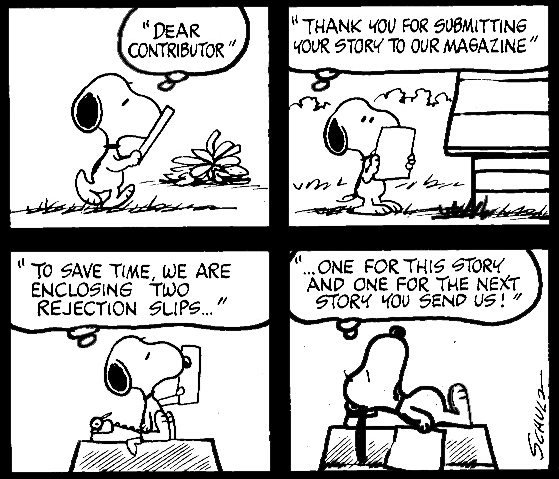
This post invites you to see rejection through a different lens-- one that is a great deal more encouraging than how most of us interpret rejection. May it empower you to put yourself out there with confidence.
My Ultimate Rejection Story (Chosen out of Literally Thousands) by Catherine Ryan Hyde
I have a number of rejection stories. I’ll bet it’s a larger number than the best guess in your head right now. I’ve written a sort of “best of” series of my rejection stories into Anne’s and my new book HOW TO BE A WRITER IN THE E-AGE—and Keep your E-Sanity
Each of the stories is meant to illuminate rejection, to show that it doesn’t mean what you think it means.
At first you think it means the work is no good, you’re not a good writer. But then how can you reconcile the fact that my short stories were rejected an average of 17 ½ times each before going on to find a good home without further revision? (You’ll read that story in our book.) Okay, so then you figure the work may be good, but you’re trying to place it with the wrong publisher. But if that were true, I wouldn’t have placed my first short story with the same magazine that issued my most vicious rejection. (You’ll also read that one.)
Now, hopefully, you’re almost where you need to be, thinking rejection really only means that this particular editor won’t publish this particular work. Hold onto your socks for what comes next: It doesn’t even mean that much.
This is the one I consider to be my ultimate rejection story.
I’d had an agent who marketed Walter’s Purple Heart to no avail (25 rejections!) and wouldn’t even take on Pay It Forward. Hated it, hated it, hated it. (Told that one in the book, too.) I told her to send both home to me, and then gave them to a newer, hungrier agent.
The new agent sold Pay It Forward to Chuck Adams at Simon & Schuster, who then immediately asked what else I might have. Out of the drawer came Walter’s Purple Heart.
He bought it in a six-figure deal right before Christmas.
Why is that my best rejection story? Because one of Walter’s Purple Heart’s 25 previous rejections was from…wait for it…Chuck Adams at Simon & Schuster.
And he knew it.
His statement on why: He said Simon & Schuster had changed. They didn’t used to let him take on the smaller, more literary works. Now they did.
My statement on why: My career had changed. A book he might not have successfully marketed as a debut could be much more saleable as a follow-up to Pay It Forward.
So there you go. The true story of rejection. It doesn’t even necessarily mean that any one particular editor won’t buy that work of fiction. It just means he (or she) chose not to buy it on that day. Later, things can change. Reader tastes, the book industry, or your name recognition.
Here’s a final question before I move on from the subject of rejection.
I once received a plain, printed rejection from a small literary journal on my short story Nicky Be Thy Name. But they accepted the next story I sent. In a phone conversation with the editor, he remembered “Nicky,” and referred to it, saying he’d come within “a hair’s breadth” of taking it.
Now, I hadn’t known that. He hadn’t said. I just figured he didn’t like it.
When we get a rejection back in the mail, we usually don’t know the process the work has gone through. We don’t know if one paragraph was read by an editorial assistant (translation=first reader, probably straight out of college) or if our work made the rounds of all editors and survived everything but the final cut.
Here’s the question:
Why do we always assume the editor(s) hated it, that we have been branded as hacks? Why don’t we ever assume that it came within “a hair’s breadth” of acceptance, and is being returned with deep regret?
 Sunday, August 10, 2014 at 11:31PM
Sunday, August 10, 2014 at 11:31PM 




